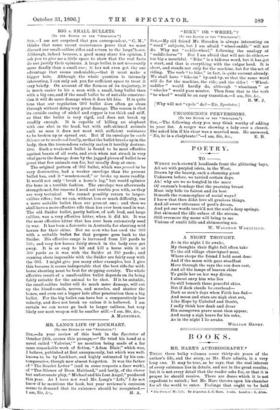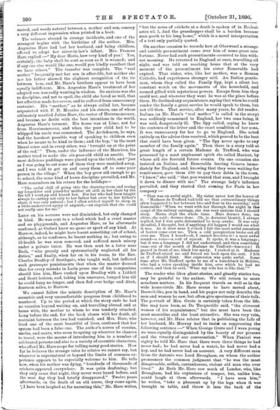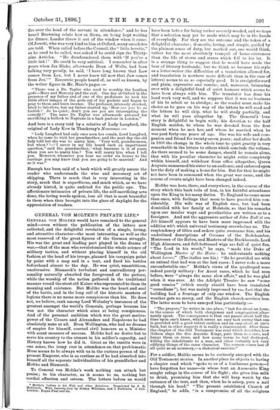BOOKS.
MR. HARE'S AUTOBIOGRAPHY.* THESE three bulky volumes cover thirty-six years of the author's life, and the story, as Mr. Hare admits, is a very long one. It may be true, as he says, that the real interest of every existence lies in details, and not in the great results; but it is not every detail that the reader asks for, or that it is proper he should receive. There are doors which it is not expedient to unlock ; but Mr. Hare throws open his chamber for all the world to enter. Feelings that ought to be held
• The Story of My Life. By A.ugastus J. 0. Hare. 3 vols. London : G. Allan. sacred, and words natural between a mother and son, convey a very different impression when printed in a book.
The volumes abound in strange incidents, and one of the strangest begins with the birthtime of the author. Mrs. Augustus Hare had lost her husband, and being childless, offered to adopt her sister-in-law's infant. Mrs. Frances Hare replied :—" My dear Maria, how very kind of you! Yes, certainly, the baby shall be sent as soon as it is weaned; and if any one else would like one, would you kindly recollect that we have others." The transfer was complete. The "real mother" frequently met her son in after-life, but neither she nor his father showed the slightest recognition of the tie between hem, and Mr. Hare's brothers appear to have been equally indifferent. Mrs. Augustus Hare's treatment of her adopted son was sadly wanting in wisdom. So anxious was she to discipline, and not to spoil, the child she loved so well, that her affection made her severe, and he suffered from unnecessary restraint. His "mother," as he always called her, became acquainted with F. D. Maurice and his sisters, one of whom ultimately married Julius Hare, the rector of Hurstmonceaux,
and became, no doubt with the best intentions in the world, Augustus Hare's torment. His home was at Lime, not far from Hurstmonceaux, and when the poor child had to be whipped his uncle was summoned. The Archdeacon, he says,
had the harshest possible way of speaking to children even when he meant to be kind to them ; and the boy," in the most literal sense and in every other, was brought up at the point of the rod.'" Then, under the influence of the Maurices, his mother tried to make the six-year-old child an ascetic. The most delicious puddings were placed upon the table, and "just as I was going to eat some of them they were snatched away, and I was told to get up and carry them off to some poor person in the village." When the boy grew old enough to go to school, the same kind of home discipline prevailed, and Mr.
Hare remembers on his return for the holidays— "The awful chill of going into the drawing-room and seeing my longed-for and pined-for mother sit still in her chair by the fire till I wentjup and kissed her. For her who had been taught always to curtsey not only to her father but even to her father's chair, it was only natural ; but I often sobbed myself to sleep in a little-understood agony of anguish,—an anguish that she could not really care for me."
Later on his sorrows were not diminished, but only changed in kind. He was sent to a school which had a cruel master and no playgrounds, and Augustus Hare, as he afterwards confessed, at Oxford knew no game or sport of any kind. At Harrow, indeed, he might have learnt something out of school, although, as he confesses, he learnt nothing in ; but owing to ill-health he was soon removed, and suffered much misery under a private tutor. He was then sent to a tutor near Bath, "who grossly and systematically neglected all his duties," and finally, when far on in his teens, to the Rev. Charles Bradley of Southgate, who taught well, but inflicted such grotesque punishments that when the master decreed that for every mistake in Latin prose one of his companions should kiss him, Hare rushed upon Bradley with a Liddell and Scott lexicon, and, taking him unawares, banged him till he could bang no longer, and then fled over hedge and ditch, fourteen miles, to Harrow.
We cannot follow the minute description of Mr. Hare's eccentric and very uncomfortable progress from childhood to manhood. 13p to the period at which the story ends he had no vocation beyond waiting on, and travelling abroad and at home with, the mother to whom he was tenderly attached.
Long before the end, for the book closes with her death, all restraint between the two had vanished, and Mrs. Hare, who lived one of the most beautiful of lives, confessed that her system bad been a false one. The author's scores of cousins, uncles, and aunts, who seem to spring up wherever he chances to travel, were the means of introducing him to a number of celebrated persons and also to a variety of eccentric characters, who afford Mr. Hare scope for telling many good stories. How far he believes the strange tales he relates we cannot say, but whatever is supernatural or beyond the limits of common ex- perience appears to be especially welcome to him. He tells how, when his mother was dying, "hundreds of thousands of crickets appeared everywhere. It was quite deafening; but they only came that night, they never were heard before, and the next day they had totally disappeared." Twelve years afterwards, on the death of an old nurse, they came again.
'LI have been laughed at for narrating this," Mr. Hare writes, "but the noise of crickets at a death is spoken of in Ecclesi- astes xii. 5, And the grasshopper shall be a burden because man goeth to his long home," which is a novel interpretation of a text only partially quoted.
On another occasion be records how at Oberwesel a strange and terrible presentiment came over him of some great mis- fortune. Never had such presentiments occurred to him with- out meaning. He returned to England at once, travelling all night, and was told on reaching home that at the very
moment of the presentiment his sister Esmeralda had. expired. That sister, who, like her mother, was a Roman Catholic, had experiences stranger still. An Italian gentle- man, whom they called the Family Spy, kept a silent but constant watch on the movements of the household, and, seemed gifted with mysterious powers. Escape from him they could not, and wherever they went he was at the place before them. He declined any acquaintance, saying that when he could render the family a great service he would speak to them, but not till then. That service, after many years, he did render._ Italima (as Mr. Hare's "real mother" is called in the story} was suddenly summoned to England, her two sons being, it was said, dangerously ill. The Spy called, saying he knew the contents of the letter and the exact condition of her Sons., Itwas unnecessary for her to go to England. She acted entirely on the advice thus received, which proved to be the best that could have been given. "The Spy never spoke to any member of the family again." Then there is a story told at- great length of a certain Madame de Trafford, who was possessed by a most unpleasant spirit she called Maricot, by whose aid she foretold future events. On one occasion she insisted on Italima and Esmeralda leaving Geneva imme- diately for England, and, knowing that they were waiting for remittances, gave them 280 to pay their debts in the town.
"I knew," she said, "that you wanted that sum, and I brought it down to dinner with me." The strange lady's influence prevailed, and they started that evening for Paris in her company :—
" That was an awful night. My sister never lost the horror of it. Madame de Trafford bad told me that extraordinary things often happened to her between two and four in the morning,' said Esmeralda! When we went with her through the night in the coupe of the railway carriage, she was very anxious that I should sleep. Mama slept the whole time. Mais dormez done, ma chere, she said ; dormez donc. Oh, je dormirai bientet, I always replied, but I was quite determined to keep awake. It was very dreadful, I thought, but if anything did happen I would see what it was. As it drew near 2 o'clock I felt the most awful sensation of horror come over me. Then a cold perspiration broke out all over me. Then I heard—oh, I cannot describe it ! a most awful sound—a voice—a sort of squeak. It spoke, it was a language ; but it was a language I did not understand, and then something came out of the mouth of Madame de Trafford—bur-r-r-r It passed in front of me, black but misty. I rushed at it. Madame de Trafford seized me and forced me back upon the seat. I felt as if I should faint. Her expression was quite awful. Some time after Mr. Trafford spoke to me of a hunchback in Moliere, who had a voice speaking inside him, over which he had no control, and then be said, What my wife has is like that.'"
The reader who likes ghost-stories, and ghastly stories too, may be grateful to the author. We will return to more mundane matters. In his frequent travels as well as in the wide home-circle Mr. Hare seems to have moved about, Boswell-like, pen in hand, and his pages not only describe the men and women he saw, but often give specimens of their talk. The portrait of Mrs. Grote is certainly taken from the life.
She may have been, as Be Toc.queville said, "the cleverest woman of his acquaintance," but she must have been the
most masculine and the least attractive. She was very vain, however, and Mr. Hare relates that in publishing the Life of her husband, Mr. Murray had to insist on suppressing the following sentence :—" When George Grote and I were young we were equally distinguished by the beauty of our persons and the vivacity of our conversation." When Panizzi was eighty he told Mr. Hare that there were three things he had never had ; he had never had a watch, he had never had a key, and he had never had an account. A very different man from Sir Antonio was Lord Brougham, on :whom the author pronounces the common judgment that "he was the most disagreeable, selfish, cantankerous, violent old man who ever lived." At Bath Mr. Hare saw much of Landor, who, like Brougham, had his explosions of temper, but, unlike him, could laugh at them afterwards. "I have seen him," he writes, "take a pheasant up by the legs when it was brought to table, and throw it into the back of the fire over the head of the servant in attendance," and he has beard Browning relate how at Siena, on being kept waiting for dinner, Landor threw it out of the window when it came. Of Jowett, who was very kind to him at Oxford, many anecdotes are told. When called before the Council, the" little heretic," as he used to be called, was asked if he could sign the Thirty- nine Articles. "He dumfoundered them with If you've a little ink ! ' He could be very satirical. I remember in after years when Jex Blake, afterwards Dean of Wells, had been talking very prosily, he said, 'I have long known that Law comes from Lex, but I never knew till now that Jaw comes from Jex.' " Eccentric people heard of, as well as known, by the writer figure in Mr. Hare's pages :—
" There was a Dr. Taylor who used to worship the heathen gods—Mars and Mercury and the rest. One day at Oxford in the presence of my father and of one of the professors he took his little silver images of the gods out of his pockets and began to pray to them and burn incense. The professor, intensely shocked, tried to interfere, but my father started up, 'How can you be so foolish ? Do be quiet ; don't you see you are interrupting the comedy?' The same Dr. Taylor was afterwards arrested for sacrificing a bullock to Neptune in a back parlour in London."
And here is a story told by a relative of Lady Langford, the original of Lady Kew in Thackeray's Newcomes :— "Lady Langford had only once seen her cousin, Lord Langford, when he came to visit her grandmother, and the next day the old lady told her she was to marry him. • Very well, grandmamma, but when ? '---• I never in my life heard such an impertinent question," said the grandmother, what business is it of yours when you are to marry him ? You will marry him when I tell you. However, whenever you hear me order six horses to the carriage you may know that you are going to be married.' And so it was."
Enough has been said of a book which will greatly amuse the reader who understands the wise and necessary, art of skipping. There is much that is very interesting in the story, much that is superfluous, and much which, as we have already hinted, is quite unfitted for the public eye. The affectionate intimacies of private life, the self-sacrificing acts done, the loving words spoken, lose all that is most beautiful in them when thus brought into the glare of daylight for the appreciation of readers.












































 Previous page
Previous page